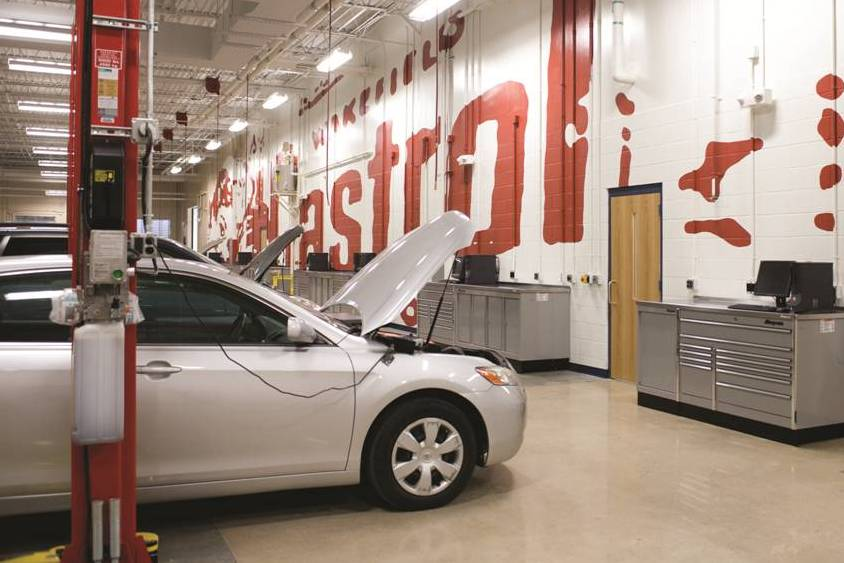Forsyth Technical Community College: Auto Correct, New Transportation Center
The state-of-the-art Transportation Technology Center at Forsyth Technical Community College (Forsyth Tech) in Winston-Salem, North Carolina, hit the ground running not a minute too soon. For the past five years, enrollment has been increasing in all the college's transportation programs: Automotive Systems Technology, Collision Repair and Refinishing Technology, Heavy Equipment and Transport Technology, the Richard Childress Race Car Technology program, and Recreational Vehicle Maintenance and Repair Technology. Shop space, computer lab space, and classrooms at the main campus were heavily strained, with classes running morning, afternoon, and evening, and some programs housed off campus.
"Historically, all those programs fill up fast, in good times and bad," said Leonard Kiser, Dean of Engineering Technologies at Forsyth Tech. In this slow economy, the fact that this training leads to jobs that cannot be shipped overseas is one of several factors driving the enrollment surge.

People are keeping their cars longer, for one thing, Kiser noted, and older cars need more repairs. The emergence of the Piedmont Triad of North Carolina as a central transportation hub is another driving force. This state is home to large trucking companies, distribution centers, and logistics companies.
Financed with local bond money, the 139,000 sq. ft. Transportation Technology Center welcomed its first students in early 2012. For the first time since Forsyth Tech's beginnings more than 50 years ago (when auto repair was one of the original programs), all the automotive programs are together at one site and can share equipment. Furthermore, students can take all their courses leading to an associate?s degree on one centrally located campus. GED and continuing education courses are also offered on the self-contained campus, serving people living in the immediate vicinity.
The 13-acre campus is the site of a former shopping center, and its perimeters provided essentially the only constraints in building the new facility. Computer labs have become an increasingly important component of training in automotive technologies, and partnerships with Toyota and Snap-on Tools assure that students are working with the most current technology, in conditions that match the jobs actually available in the industry.
"Toyota is providing the center with cars for students to work on," Kiser said, noting that in many training programs work on whole vehicles has given way to simulations.
"Snap-on has located a diagnostic center on our new campus, so that technicians can come to Forsyth Tech to be trained and certified on their specific equipment," he said. "Virtually all major dealerships and garages use Snap-on tools in their shops."
Technologically sophisticated, the center is also green; it was built with LEED standards in mind. In addition, the Transportation Technology Center will soon be able to claim international connections. In October 2011, a delegation from Zilang Vocational and Technical College in China came to work out a student exchange program with Forsyth Tech. The Transportation Technology Center caught their eye.
"They were impressed with how hands-on it is," said Kiser. "The Race Car Technology program particularly intrigued them."
NASCAR hasn't reached China yet, but you never know. Faculty from Zilang Tech are spending six weeks at Forsyth Tech this summer to learn how to teach race car technology to students back in China.
Contact: Leonard Kiser, Dean, Engineering Technologies










